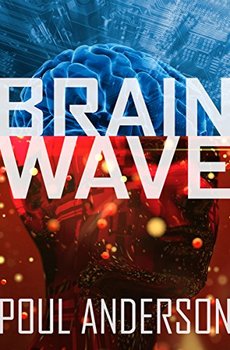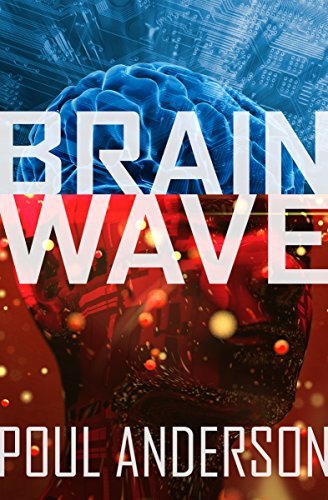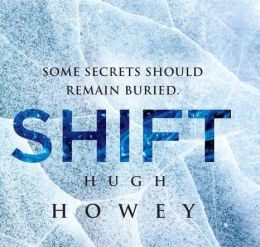
Just as history books often tell us more about historians than they do about history, genre fiction can reveal a great deal about its authors and the times during which they write. History books fall into disfavor as new information comes to light, making way for new interpretations of the facts. And science fiction and mystery novels sometimes lose their appeal as our understanding of the world around us evolves with new discoveries and changed views of society. An excellent case in point is the 1954 novel Brain Wave by science fiction master Poul Anderson, in which worldwide everyone’s IQ suddenly doubles.
Estimated reading time: 5 minutes
An intriguing premise
Brain Wave opens with an intriguing premise. Since the neurons in our brains communicate electromagnetically, human intelligence could be greatly altered by any significant change in the electromagnetic environment in which the Earth is located. And in the novel, our IQ suddenly doubles or more as the planet speeds out of a zone of the Milky Way characterized by unusually strong magnetism.
Brain Wave by Poul Anderson (1954) 199 pages ★★★☆☆

All of a sudden, practically everybody’s a genius
Initially, we view this change through the eyes of neuroscientists working in a privately funded research institute in New York. Within days, they find their IQs shooting upward to the 400s or 500, equipping them with never-before-seen problem-solving abilities. Soon, however, we also experience a farmhand named Brock’s newly expanding consciousness as his IQ rises from sub-normal to what is today considered genius level. In other words, Brock’s IQ suddenly doubles or triples. Meanwhile, however, every other being with a brain goes through similar changes—including the pigs, cows, and horses on the farm and the animals in a zoo.
So far, so good. Anderson might have taken this premise and built upon it a fascinating tale in which science achieves spectacular breakthroughs and the great mass of people find ways to make their lives more rewarding. But no. His Right-Wing belief in the base instincts of human nature led him astray.
Here’s where the silliness comes in
- Civilization crumbles, as people in boring jobs simply walk away and a fast-growing apocalyptic cult sets out to murder scientists all over the country. And we’re supposed to believe that all this takes place because everyone’s IQ suddenly doubles. Admittedly, a high IQ doesn’t necessarily ensure that anyone is rational, but it does correlate with a superior ability to solve problems.
- In the Soviet Union—this book was published in 1954, just one year after the death of Joseph Stalin—the government unleashes thermonuclear missiles on the United States. [We know now they had no such capability then and didn’t for several years thereafter.] At the same time, the scientists themselves are wandering off into secret projects of their own.
- One of those projects is to design a nuclear shield akin to the Star Wars project fantasized by the Reagan Administration.
- In another project, a handful of physicists design a faster-than-lightspeed drive and, with an engineer or two, manages to build a starship in a matter of weeks. (Yes, really.) Then, to compound the silliness, two scientists head off for the stars. Alone. And what do they find? Plants growing on Mars and fourteen of the nineteen extra-solar planets they visit in our region of the Milky Way are inhabited by intelligent life!
Apparently, all this was imaginable in the 1950s. The book was published, after all. Somebody thought it worthy. But it’s all nonsensical now.
Comparing Brain Wave to a much better book
So, why haven’t I given this book a rating of zero or one instead of three-and-and-half? Truth to tell, Poul Anderson writes very well. Given the absurd assumptions he builds into the story, his characters act in predictable ways. Brain Wave is a professional piece of work. It’s just silly.
For a more interesting take on suddenly enhanced intelligence, see the classic 1960 novel, Flowers for Algernon by Daniel Keyes. It won the Hugo for Best Short Story when first published in 1959 and shared the Nebula in 1966 for the novel in its expanded version. Like the character of the farmhand Brock in Anderson’s novel, Charlie Gordon is mentally challenged but he becomes far more intelligent following surgery—temporarily.
A more recent novel on a related theme is The Genius Plague by David Walton—The greatest threat to humanity is . . . a mushroom? It, too, is a much better book than Anderson’s.
About the author

Poul Anderson (1926-2001) was widely regarded as one of the leading lights of the science fiction community for much of the last half of the twentieth century. He won seven Hugo Awards and three Nebula Awards and was honored as a Grand Master of the Science Fiction Writers of America in 1997. He was Danish-American and spoke both languages with ease. Anderson’s politics veered to the Right and toward libertarianism, reflecting his dark view of human nature. He was a cofounder of the Society for Creative Anachronism,
For related reading
I’ve also reviewed the author’s disappointing novel, The Corridors of Time (A legendary sci-fi author makes a mess of time travel). But I’ve enjoyed other books he’s written, including The Avatar (Alien life abounds in our starfaring future) and Tau Zero (In this great example of classic hard science fiction, humankind reaches the stars).
For more good reading, check out:
- These novels won both Hugo and Nebula Awards
- The ultimate guide to the all-time best science fiction novels
- The top science fiction novels
- 10 new science fiction authors worth reading now
- The five best First Contact novels
- Good books about space travel
And you can always find my most popular reviews, and the most recent ones, on the Home Page.


























